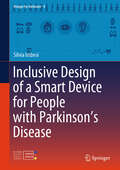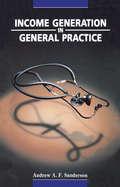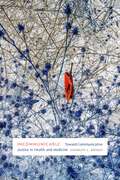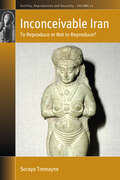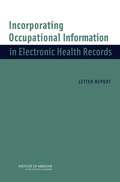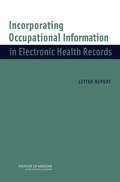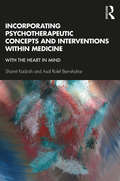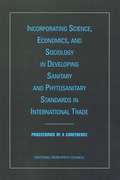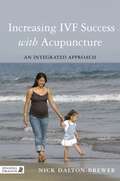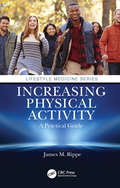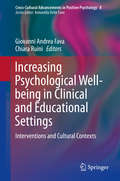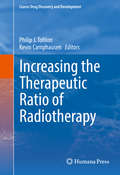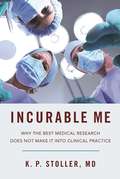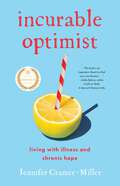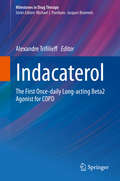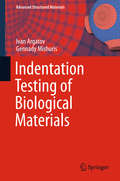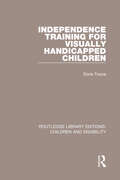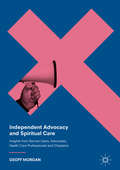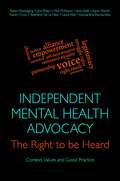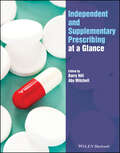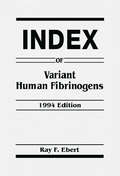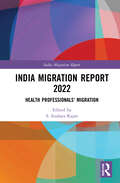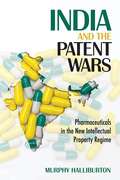- Table View
- List View
Inclusive Design of a Smart Device for People with Parkinson’s Disease (Design For Inclusion #4)
by Silvia ImbesiThis book reports on an inclusive design project aimed at developing IoT-based wearable devices for special populations. Specifically, it covers the design, the implementation and testing of a smart mHealth system that uses sensory cues to monitor and train the gait and posture of people with Parkinson’s disease. It presents a user-centred strategy to better involve the users in defining the most suitable type of sensory cues and their combination, and in the design of the user interface, at the purpose of developing a gait tutoring system that better fits users’ needs and requirements. All in all, this book offers extensive information on the state-of-the-art in the design and testing of innovative user-centred mHealth systems. Giving a particular attention to the explanation of the tools and methodological choices, it provides readers with a timely reference guide to understand and deal with complex inclusive design projects.
Income Generation in General Practice
by Andrew A Sanderson'When I want to know the real rock-bottom truth about what happens all the time in this doctoring life what happens to us and to the folks who bring us their hearts and worries to be heard that's when I turn every time to the novelists the playwrights the poets the essayists who have given us the sights and sounds the feel of all that goes on minute by minute. What Tolstoy and Chekhov knew we need to know for ourselves for our own sakes as we live out our medical lives.' William Carlos Williams 'The most fundamental of all consulting skills is genuine curiosity about other people the constant urge to wonder 'Why are they as they are?' We should open our minds to the life of the imagination not just for its entertainment value but for the mindset of curiosity it engenders in us. Such books as John Salinsky describes in this and his previous volume combine powerful opportunities for our own professional growth with pleasure and recreation too.' Roger Neighbour in his Foreword 'This carefully assembled wonderfully telling book is a "companion" for sure a lasting and most helpful one for the medical travelling that awaits us.' Robert Coles in his Foreword
Incommunicable: Toward Communicative Justice in Health and Medicine
by Charles L. BriggsIn Incommunicable, Charles L. Briggs examines the long-standing presumptions that medical discourse translates easily across geographic, racial, and class boundaries. Bringing linguistic and medical anthropology into conversation with Black and decolonial theory, he theorizes the failure in health communication as incommunicability, which negatively affects all patients, doctors, and healthcare providers. Briggs draws on W. E. B. Du Bois and the work of three philosopher-physicians—John Locke, Frantz Fanon, and Georges Canguilhem—to show how cultural models of communication and health have historically racialized people of color as being incapable of communicating rationally and understanding biomedical concepts. He outlines incommunicability through a study of COVID-19 discourse, in which health professionals defined the disease based on scientific medical knowledge in ways that reduced varieties of nonprofessional knowledge about COVID-19 to “misinformation” and “conspiracy theories.” This dismissal of nonprofessional knowledge led to a failure of communication that eroded trust in medical expertise. Building on efforts by social movements and coalitions of health professionals and patients to craft more just and equitable futures, Briggs helps imagine health systems and healthcare discourses beyond the oppressive weight of communicability and the stigma of incommunicability.
Inconceivable Iran: To Reproduce or Not to Reproduce? (Fertility, Reproduction and Sexuality: Social and Cultural Perspectives #50)
by Soraya TremayneCelebrating the 50th volume of the landmark Fertility, Reproduction and Sexuality series, this book offers a much-needed analysis of shifting reproductive policies and practices in the Islamic Republic of Iran, a society that is usually represented as either “revolutionary” or “oppressive.” Instead, Tremayne reflects on more than four decades of research arguing that changing reproductive behaviors on the part of ordinary Iranians must always be viewed against the backdrop of core cultural values and traditions, which are often reinforced, instead of radically altered, by new reproductive technologies, juridical opinions, and state policies.
Incorporating Occupational Information in Electronic Health Records: Letter Report
by Linda Hawes CleverEach year in the United States, more than 4,000 occupational fatalities and more than 3 million occupational injuries occur along with more than 160,000 cases of occupational illnesses. Incorporating patients' occupational information into electronic health records (EHRs) could lead to more informed clinical diagnosis and treatment plans as well as more effective policies, interventions, and prevention strategies to improve the overall health of the working population. At the request of the National Institute for Occupational Safety and Health, the IOM appointed a committee to examine the rationale and feasibility of incorporating occupational information in patients' EHRs. The IOM concluded that three data elements - occupation, industry, and work-relatedness - were ready for immediate focus, and made recommendations on moving forward efforts to incorporate these elements into EHRs.
Incorporating Occupational Information in Electronic Health Records: Letter Report
by The National Academy of SciencesEach year in the United States, more than 4,000 occupational fatalities and more than 3 million occupational injuries occur along with more than 160,000 cases of occupational illnesses. Incorporating patients' occupational information into electronic health records (EHRs) could lead to more informed clinical diagnosis and treatment plans as well as more effective policies, interventions, and prevention strategies to improve the overall health of the working population. At the request of the National Institute for Occupational Safety and Health, the IOM appointed a committee to examine the rationale and feasibility of incorporating occupational information in patients' EHRs. The IOM concluded that three data elements - occupation, industry, and work-relatedness - were ready for immediate focus, and made recommendations on moving forward efforts to incorporate these elements into EHRs.
Incorporating Psychotherapeutic Concepts and Interventions Within Medicine: With the Heart in Mind
by Shamit Kadosh Asaf Rolef Ben-shaharThis book provides doctors with insights into psychological and relational dynamics to better understand themselves and their patients, deepen their understanding of somatic and psychic dimensions of illness, and give them diagnostic and therapeutic tools to design better treatment procedures for patients. In the first part of the book, the authors explore cognitive, emotional, and somatic strategies that are supportive of doctors’ well-being. In the second part, they introduce theoretical knowledge and applicable skills from psychotherapy that can illuminate the complexity of the doctor-patient relationship, broaden doctors' approaches, and upgrade their communicative skills. The third part introduces some of the basic tenets of somatic psychotherapy that can deepen doctors' understanding of symptoms and illness, providing them with richer therapeutic tools and a deeper knowledge of bodily and psychological aspects, interweaving in a variety of medical conditions. This text not only provides a helping hand to both doctors and psychotherapists in designing an amalgamated approach to clinical treatment but also provides doctors with better tools for understanding and managing the intricacies of the doctor-patient relationship.
Incorporating Science, Economics, and Sociology in Developing Sanitary and Phytosanitary Standards in International Trade: Proceedings of a Conference
by Board On Agriculture Natural ResourcesThe National Academies Press (NAP)--publisher for the National Academies--publishes more than 200 books a year offering the most authoritative views, definitive information, and groundbreaking recommendations on a wide range of topics in science, engineering, and health. Our books are unique in that they are authored by the nation's leading experts in every scientific field.
Increasing IVF Success with Acupuncture: An Integrated Approach
by Nick Dalton-BrewerThis practical book provides need-to-know information vital for acupuncturists to treat patients with fertility problems. Nick Dalton-Brewer details the causes of fertility issues, including the impact of lifestyle and diet, and explains the scientific basis for the different methods of treatment. Integrating Assisted Reproduction Techniques (ART) with Traditional Chinese Medicine (TCM) therapies and acupuncture, he presents his own cutting-edge research on the successful use of these therapies to improve fertility and pregnancy rates and describes a method for integrated diagnosis and treatment. This book will give TCM practitioners direct access to the vital specialist knowledge and technical information needed to treat the increasing numbers of patients with fertility problems effectively. It will also be of interest to doctors of Western medicine concerned about the efficacy of recommending acupuncture treatments as adjuncts to ART.
Increasing Physical Activity: A Practical Guide (Lifestyle Medicine)
by James M. RippeOnly a fifth of adults in the United States do enough physical activity to meet the guidelines set by Centers for Disease Control. The health benefits of regular physical activity are beyond dispute, yet less than 40% of physicians routinely counsel their patients on the importance of physical activity. Increasing Physical Activity: A Practical Guide equips healthcare practitioners to include physical activity counseling in the daily practice of medicine. Written by lifestyle medicine pioneer and cardiologist, Dr James Rippe, this book proves inactivity is a stronger risk factor than other lifestyle factors for cardiovascular disease, diabetes, and many other diseases. It provides evidence-based information on the role of physical activity in preventing and treating chronic conditions and includes practical strategies for healthcare practitioners to prescribe this powerful method to enhance both short and long-term health and quality of life. Features: Specific chapters explain the role of physical activity in reduction of risk of heart disease, diabetes, cancer, osteoarthritis, dementia and many other chronic conditions. Chapters begin with bulleted, key points and conclude with a list of clinical applications. Strategies are provided to encourage previously sedentary individuals to adopt regular physical activity. Physical activity is placed in the context of other lifestyle medicine concepts including maintenance of a healthy body weight, following sound nutritional practices, stress reduction and other practices which impact on health and quality of life. Written for healthcare practitioners at all levels, this is a user-friendly, evidence-based manual for healthcare practitioners looking to incorporate more physical activity counseling into either general medicine or subspecialty practices.
Increasing Psychological Well-being in Clinical and Educational Settings
by Giovanni Andrea Fava Chiara RuiniThis volume deals with strategies aimed at increasing psychological well-being in both clinical and non-clinical settings, with a special focus on the impact of cross-cultural influences on these processes. Consisting of two parts, the book first examines clinical interventions for increasing well-being and positive functioning in adult populations. It looks at cultural differences in the experience of psychological well-being, presents an analysis of the concept of psychological well-being and discusses various interventions, including Well-Being Therapy and Cognitive Behavioral Therapy. Other concepts discussed are post-traumatic growth, wisdom and motivation. The second part of the book deals with psychological interventions in childhood and adolescence and has a strong emphasis on educational settings. It provides an overview of the main evidence-based psychotherapies for affective disorders in youths, and looks at the importance and impact of positive education, resilience, and hope. The book presents models for intervention and discusses several therapies in detail.
Increasing the Therapeutic Ratio of Radiotherapy
by Philip J. Tofilon Kevin CamphausenCurrent cancer therapies are focused on three general strategies: modifying intrinsic radiosensitivity via molecular targeting, manipulating microenvironmental factors to enhance tumor susceptibility to radiation, and improving delivery of radiation to critical tumor locations while sparing normal tissues. The goal of this volume is to describe a number of promising approaches corresponding to each strategy. In general, research in radiation oncology tends to be siloed into fundamental biology, physics or treatment delivery. The strategies for improving therapeutic ratio encompassed in this book will involve each of these components of radiation oncology. Thus, they will illustrate the variety of disparate approaches available for potentially improving the efficacy of radiotherapy, which may then stimulate discussion across disciplines and foster further translational investigations. Although a goal of each chapter will be to highlight advances within an approach, of equal importance will be the delineation of barriers to successful clinical application and how to overcome or minimize such impediments. Along these lines, because therapeutic ratio incorporates both tumor and normal tissue radio response, a point of emphasis will be the mechanistic rationale for selectively modifying tumor (sensitization) or normal cells (protection). Finally, whereas the literature is replete with studies describing potential targets/strategies for increasing the therapeutic ratio for radiotherapy, this book will focus on those supported by in vivo data consistent with impending translational application along with those that are already being evaluated in the clinic.
Incurable Me: Why the Best Medical Research Does Not Make It into Clinical Practice
by Kenneth StollerIn Incurable Me, a maverick physician brings transparency to some of medicine's most closely guarded secrets. As he establishes a link between commerce and medical research, K. P. Stoller also explains how to treat some of the most worrisome diseases and conditions afflicting humans today-including Lyme disease, brain trauma, dementia, and autism.Dr. Stoller maintains that the best evidence in medical research is not incorporated into clinical practice unless the medical cartel has the potential to make large amounts of money promoting the results of the research. Stoller takes his provocative argument a step further, maintaining that if specific research conflicts with a powerful entity's financial interests, the likely result will be an effort to suppress or distort the results. Stoller cites numerous examples, including corporate influence on GMO labeling and public health.Stoller also explores how "revolving-door-employment" between the Centers for Disease Control and large pharmaceutical companies can affect research results-as well as our health. Written in an accessible style that is thoroughly appropriate for a lay audience, Incurable Me is a must-read for anyone interested in the state of modern medicine.
Incurable Optimist: Living with Illness and Chronic Hope
by Jennifer Cramer-Miller2024 International Impact Book Awards Winner: Family and Medical Book of Excellence Award Winner: Family Publishers Weekly, starred review, PW Book of the Week, August 2023 At twenty-two, Jennifer Cramer-Miller was thrilled with her new job, charming boyfriend, and Seattle apartment. Then she received a devastating autoimmune diagnosis—and suddenly, rather than planning for a bright future, she found herself soaking a hospital pillow with tears and grappling with words like &“progressive&” and &“incurable.&” That day, Cramer-Miller unwillingly crossed over from wellness to chronic illness—from thriving to kidney failure. Her chances of survival hinged upon on the expertise of doctors, the generosity of strangers, and the benevolence of loved ones. But what kind of life would that be? Spanning two-plus decades, this family love story explores loss and acceptance, moving forward with uncertainty, and forging a path to joy. Four kidney transplants later, Cramer-Miller is here to shine a bright light on people helping people in difficult times with a story that will make you want to hug the humans you love. Because sometimes it&’s the sorrows that threaten to pull us apart that ultimately unite us in hope.
Indacaterol
by Alexandre TrifilieffChronic obstructive pulmonary disease (COPD) is a multi-component condition that results in increasingly limited airflow, usually associated with an abnormal inflammatory response of the lung. It constitutes a major public health burden worldwide, while only very few effective therapies are available. This book provides a comprehensive overview of the development of Onbrez Breezhaler, a newly approved once-daily inhaled β2 agonist for the treatment of COPD. It reviews the current pharmacotherapy for COPD and discusses topics such as the chemical design and the pre-clinical pharmacology of the molecule, the early clinical development, the INHANCE study (which provides a successful example of the use of an adaptive design in the confirmatory setting) and the Phase III clinical efficacy study, as well as the history and performance of the Breezhaler device. Finally, a list of emerging targets is included that could well offer future treatment options for COPD.
Indentation Testing of Biological Materials (Advanced Structured Materials #91)
by Gennady Mishuris Ivan ArgatovThis book presents a comprehensive and unifying approach to analytical identification of material properties of biological materials. Focusing on depth-sensing indentation testing, pipette aspiration testing, and torsion of soft tissues, it discusses the following important aspects in detail: damping, adhesion, thickness effect, substrate effect, elastic inhomogeneity effect, and biphasic effect. This book is intended for advanced undergraduate and graduate students, researchers in the area of biomechanics as well as for biomedical engineers interested in contact problems and involved in inverse materials parameters prediction analysis.
Independence Training for Visually Handicapped Children
by Doris ToozeFirst published in 1981, this book was written to help parents and teachers to participate in child-based mobility programmes, covering the needs of visually-handicapped children from pre-school to adulthood. It gives insight into ways in which these figures can make the world meaningful to young children, as well as making them aware of the special training that is necessary to develop the social skills of daily living that a sighted child acquires through imitation. Travel techniques must be learnt to enable these children to move independently and the book describes various methods that can be used by the blind traveller. It also examines the role of physical education and dance, both of particular importance for the visually-handicapped child at school age.
Independent Advocacy and Spiritual Care
by Geoff MorganThis book explores the profession of independent advocacy through a history of the practice, and provides an empirical study of its emergence in London. While advocacy has long been associated with professions such as social work and mental health nursing, this book delivers a unique perspective of advocacy through the lens of faith and culture. Using real life examples and insights from service users, advocates and spiritual care practitioners in the advocacy and chaplaincy sectors, the fascinating results offer proposals for enhanced theory, training and practice in independent advocacy. It will be of great interest for students and professionals engaged in advocacy or spiritual care.
Independent Mental Health Advocacy - The Right to Be Heard: Context, Values and Good Practice
by Karen Newbigging Konstantina Poursanidou Karen Machin Toby Brandon Stephanie De Haye Julie Ridley Laura Able Mick Mckeown Kaaren Cruse June Sadd Kris ChasteyIndependent mental health advocacy is a crucial means of ensuring rights and entitlements for people sectioned under the Mental Health Act. This book takes an appreciative but critical view of independent mental health advocacy, locating the recent introduction of Independent Mental Health Advocates (IMHAs) within a broader historical, social and policy context, and anticipates future developments. The text includes the voices of service users throughout, both as authors and research participants. Drawing on their research, the authors provide a historical overview of mental health advocacy, independent mental health advocacy in relation to the law, the role and responsibilities of IMHAs, essential values, knowledge and skills required of advocates, relationships with service providers, commissioning, measuring advocacy outcomes, and how IMHA services can be made accessible and appropriate to diverse groups. This will be essential reading for advocates, social work professionals, academic staff and trainers and will provide mental health professionals with an understanding of, and critical reflection on, the IMHA role. It will also be of particular general interest to survivors and mental health service users, and their families and carers.
Independent and Supplementary Prescribing
by Molly Courtenay Matt Griffiths June Crown CbeThe second edition of Independent and Supplementary Prescribing builds on the success of this classic text by providing a unique resource for prescribing and medicines management for both new and experienced prescribers. This is an essential resource for anyone undertaking the non-medical prescribing programme. The book explores a number of key areas for prescribers, including the ethical and legal issues surrounding prescribing, prescribing within a public health context, evidence-based prescribing, basic pharmacology, medication safety, monitoring skills and drug calculations. Each chapter has been updated for the second edition and an additional chapter 'Minimising the risk of prescribing error' has been added. Written by a group of multi-professional authors working at all stages of the medication management process, this book will be essential reading for all nurses, midwives, pharmacists and allied health professionals qualified to prescribe as independent and/or supplementary prescribers.
Independent and Supplementary Prescribing At a Glance (At a Glance (Nursing and Healthcare))
by Ian PeateIndependent and Supplementary Prescribing At a Glance The market-leading at a Glance series is popular among healthcare students and newly qualified practitioners for its concise, simple approach and excellent illustrations. Each bite-sized chapter is covered in a double-page spread with clear, easy-to-follow diagrams, supported by succinct explanatory text. Covering a wide range of topics, books in the at a Glance series are ideal as introductory texts for teaching, learning and revision, and are useful throughout university and beyond. Everything you need to know about Independent and Supplementary Prescribing  at a Glance! Independent and Supplementary Prescribing At a Glance is an accessible and practical resource for healthcare students looking to become independent and supplementary prescribers. Each part of the book is mapped against a recognised prescribing framework published by the Royal Pharmaceutical Society (RPS) for all Registered Healthcare Professionals, and addresses NMC and HCPC regulatory body requirements. The text presents full-colour images, a user-friendly approach to key prescribing topics, and a structure that allows readers to dip-in and out as needed, appealing to a variety of learning styles. Topics include: Professional, legal, and ethical prescribing considerations; independent and supplementary prescribing; critical thinking and clinical reasoning; exploring interventions and differential diagnosis Non-pharmacological approaches and pharmacological treatment options; prescribing reference guides, medication selection and how to prescribe Holistic assessment, quality of life, and evidence-based practice; public health, infection prevention and control; consultation models and principles of history taking and physical examination skills Building relationships, inclusive prescribing and informed choices; medicine optimisation, adverse reactions, and prescribing generic products Independent and Supplementary Prescribing At a Glance is a comprehensive and complete learning and study resource for Registered Nurses, Registered Midwives, Physician Associates and Healthcare Professionals who want to become independent prescribers within the UK. For more information on the complete range of Wiley nursing and health publishing, please visit: www.wiley.com To receive automatic updates on Wiley books and journals, join our email list. Sign up today at www.wiley.com/email All content reviewed by students for students Wiley nursing books are designed exactly for their intended audience. All of our books are developed in collaboration with students. This means that our books are always published with you, the student, in mind. If you would like to be one of our student reviewers, go to www.reviewnursingbooks.com to find out more. This new edition is also available as an e-book. For more details, please see www.wiley.com/buy/9781119837916
Index of Medical Imaging
by Jonathan McConnellThe ‘Index of Medical Imaging' is the must-have companion for diagnostic radiography students and newly qualified imaging practitioners, designed to allow easy access to descriptions and discussions of many aspects of medical imaging such as radiographic projections, positioning, procedures and clinical examinations. The Index consists of multiple lists, tables and discussions linked to (amongst others) radiography, CT, MRI and components such as radiological contrast agents, responses to contrast reactions, MRI safety. There is a glossary of terms and definitions plus a list of abbreviations that may be encountered within radiology. Tables are given that suggest the order and type of examination that should be performed as defined by the UK Royal College of Radiologists. FEATURES • Supports clinical decision-making • Glossary of key terms and abbreviations • Unique format that consists of multiple lists, tables and discussions
Index of Variant Human Fibrinogens
by Ray F. EbertWhether you're a clinician concerned with patient management, a technician involved in diagnostic testing, or an investigator studying fibrinogen structure and function, you'll find that the 1994 Index of Variant Human Fibrinogens. is a valuable resource. It contains not only the most comprehensive compilation of the world literature and research on dyfibrinogenemia, but also includes a synopsis for health professionals and expert guidance for the diagnosis and treatment of dysfibrinogenemia, the study of genetically abnormal human fibrinogens. Furthermore, this book provides the latest DNA and protein sequences (including the AaE chain) and listings of available PCR primers and anti-fibrinogen antibodies. Add to this a set of 263 Dysfibrinogen Reports tracking more than 30 different characteristics for each variant, plus 9 summary tables and a comprehensive bibliography, and the result is an authoritative companion for the diagnosis and management of this multifaceted and complex disease.Compare your patient's laboratory profile, clinical manifestations, or molecular defect with virtually all others in the literature. Consider all the options for treating bleeding or thrombotic complications. Determine if your data from a newly identified variant are unique. Spend an hour with this book and see if it doesn't save many hours of literature searching and summarizing!
India Migration Report 2022: Health Professionals' Migration (India Migration Report)
by S. Irudaya RajanIndia Migration Report 2022 is one of the first volumes to focus comprehensively on Indian health professionals’ migration. The essays in the volume discuss the reasons, challenges and opportunities that daunt and prompt health professionals to migrate within and outside India. This volume: • Explores the history of migration of health professionals, especially nurses from India; • Focuses in economic and social drivers of migration among health professionals; • Examines shifting patterns in migration as well as emergence of new destinations for migrants; • Studies the economic and social impact of COVID-19 among migrant health professionals; • Highlights the influence of remittances on rural economies in India. Timely, data-driven and drawing on exhaustive fieldwork, the volume looks at Indian health professionals in North America, Middle East, Asia Pacific and South Asia. It will be of interest to scholars and researchers of development studies, public health, public policy, economics, demography, sociology and social anthropology, and migration and diaspora studies.
India and the Patent Wars: Pharmaceuticals in the New Intellectual Property Regime (The Culture and Politics of Health Care Work)
by Murphy HalliburtonIndia and the Patent Wars contributes to an international debate over the costs of medicine and restrictions on access under stringent patent laws showing how activists and drug companies in low-income countries seize agency and exert influence over these processes. Murphy Halliburton contributes to analyses of globalization within the fields of anthropology, sociology, law, and public health by drawing on interviews and ethnographic work with pharmaceutical producers in India and the United States.India has been at the center of emerging controversies around patent rights related to pharmaceutical production and local medical knowledge. Halliburton shows that Big Pharma is not all-powerful, and that local activists and practitioners of ayurveda, India’s largest indigenous medical system, have been able to undermine the aspirations of multinational companies and the WTO. Halliburton traces how key drug prices have gone down, not up, in low-income countries under the new patent regime through partnerships between US- and India-based companies, but warns us to be aware of access to essential medicines in low- and middle-income countries going forward.
